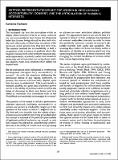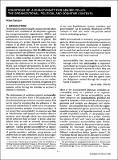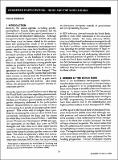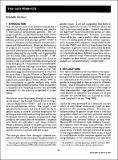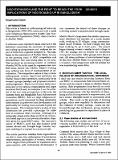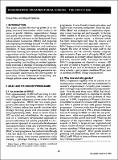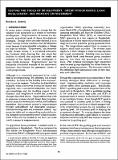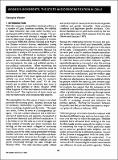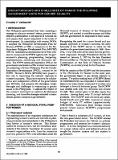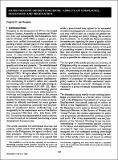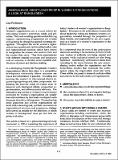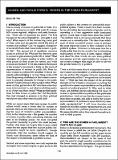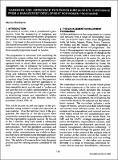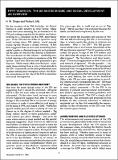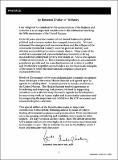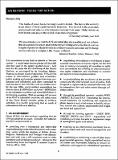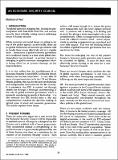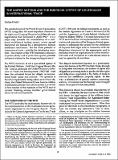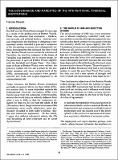Volumes 21 - 30: Getting Institutions Right for Women in Development: Recent submissions
Now showing items 241-260 of 444
-
Getting Representation Right for Women in Development: Accountability, Consent, and the Articulation of Women's Interests
(Institute of Development Studies, 01/07/1995)Summary To what extent does the recent emphasis upon accountability by development institutions augur well for women? This article firstly describes how accountability is grounded upon the concept of consent as the principal ... -
Conditions of Accountability for Gender Policy: The Organizational, Political and Cognitive Contexts
(Institute of Development Studies, 01/07/1995)Summary Gender policy cannot be designed and implemented without an analysis of institutions within which it is practised. Whether institutions are responsive to gender issues or not determines the success of gender policy. ... -
Gendered Participation: Ngos and The World Bank
(Institute of Development Studies, 01/07/1995)Summary Although NGOs have recently been active in advocating for changes in the World Bank's treatment of environmental and social issues, they have not been as vocal on gender issues. There are various reasons for this, ... -
Fish and Feminists
(Institute of Development Studies, 01/07/1995)Summary Despite apparent acceptance of gender analysis within development organizations, this is still only rarely translated into gender?sensitive practice. The language of gender and development is adopted, but is ... -
NGO Expansion and the Fight to Reach the Poor: Gender Implications of NGO Scaling?Up in Bangladesh
(Institute of Development Studies, 01/07/1995)Summary The gender implications of a growing trend of NGO competition and encroachment in rural Bangladesh are discussed using case studies of the Grameen Bank and Bangladesh Rural Advancement Committee (BRAC). The examples ... -
Engendering Organizational Change: The Brac Case
(Institute of Development Studies, 01/07/1995)Summary This article analyses the first phase of an ongoing structural intervention which works at the nexus of gender relations, organizational change, and quality improvement, with a large rural development NGO in South ... -
Testing the Tools of Development: Credit Programmes, Loan Involvement, and Women's Empowerment
(Institute of Development Studies, 01/07/1995)Summary The effectiveness of a credit programme at empowering women depends on the success with which it defines for itself and its workers ways to challenge, while working within, the constraints on women's empowerment ... -
Women's Movements, the State and Democratization in Chile
(Institute of Development Studies, 01/07/1995)Summary This article examines one attempt by feminists to engage with the state through an analysis of SERNAM, the Chilean women's bureau established in 1990 by the centre left civilian government. It argues that it is ... -
Women Organizing Women –‘Doing it Backwards and in High Heels’
(Institute of Development Studies, 01/07/1995)Summary This article looks at the formative stages of a Zimbabwean NGO, the Musasa Project. The process of arriving at a particular organizational model is examined. Particular attention is paid to two aspects of this ... -
Breakthroughs and Challenges of Making the Philippine Government Work for Gender Equality
(Institute of Development Studies, 01/07/1995)Summary This is an ‘insider’ account of the history of institutionalizing a special bureaucratic instrument for the promotion of women's interests in development planning – the National Commission on the Role of Filipino ... -
Mainstreaming Gender Concerns: Aspects of Compliance, Resistance and Negotiation
(Institute of Development Studies, 01/07/1995)Summary The experiences in the Philippines show that progress, though slow, has been achieved in mainstreaming gender concerns in government policies. However, this progress has come about neither spontaneously nor as a ... -
Ambivalence about Leadership in Women's Organizations: a Look at Bangladesh
(Institute of Development Studies, 01/07/1995)Summary Women's organizations present special challenges for leadership. Feminist organizers are trying to create new organizational structures based on sharing power more equitably among members but they are still in ... -
Women and Public Power: Women in the Indian Parliament
(Institute of Development Studies, 01/07/1995)Summary This article explores the issue of women's representation in state institutions, in this case the Indian parliament. It is based on interviews with fifteen women members of parliament, and examines: 1) the profile ... -
‘Sameness’ and ‘Difference’ for Women Bureaucrats: Experience from a Management Development for Women Programme
(Institute of Development Studies, 01/07/1995)Summary This article uses experience from a management development programme (run by RIPA International in London) for women civil servants from the ‘south’ to explore how participants are required to be both ‘the same’ ... -
FIFTY YEARS ON: THE UN AND ECONOMIC AND SOCIAL DEVELOPMENT AN OVERVIEW
(Institute of Development Studies, 01/10/1995) -
PREFACE
(Institute of Development Studies, 01/10/1995) -
UN REFORM: FOCUS FOR ACTION
(Institute of Development Studies, 01/10/1995)SUMMARY Judged by the perspectives of 50 years, the UN system has had more influence and more successes than is often realized, especially in the economic and social arena. Priorities for future UN action in these areas ... -
AN ECONOMIC SECURITY COUNCIL
(Institute of Development Studies, 01/10/1995)SUMMARY An Economic Security Council is urgently needed to address issues of global human security (e.g. drugs, pollution, spread of diseases, terrorism, migration), global development (e.g. growth, employment, debt, ... -
THE UNITED NATIONS AND THE EMERGING SYSTEM OF GOVERNANCE IN INTERNATIONAL TRADE
(Institute of Development Studies, 01/10/1995)SUMMARY The establishment of the World Trade Organization (WTO), resulting from the Uruguay Round of multilateral trade negotiations, is a major step towards the consolidation of a rule?based multilateral trading system, ... -
THE GOVERNANCE AND MANDATES OF THE INTERNATIONAL FINANCIAL INSTITUTIONS
(Institute of Development Studies, 01/10/1995)SUMMARY Increased interdependence makes global economic governance more important than ever. New objectives, including the elimination of poverty and supporting the environment, require new forms of global governance, ...

